Israeli Prime Minister Benjamin Netanyahu will arrive in India on Sunday to lead a trade task force of over 100 businesspeople and entrepreneurs – including from over two dozen startups and a number of major defense industry companies – in the biggest state visit to the subcontinent in over a decade.
The last time an Israeli prime minister visited India was in 2003, when Ariel Sharon became the first Israeli prime minister to make that trip.
Netanyahu’s visit is aimed at deepening political, cultural and business ties between the two countries, and follows a successful trip to Israel last July by Indian Prime Minister Narendra Modi. That visit was the first to Israel by an Indian head of government since the countries first established official diplomatic ties in 1992. The visit was seen as heralding a new era in India-Israel relations, though these relations were rumored to have taken a hit last month when the Indian Ministry of Defense reportedly canceled a $500 million deal to buy some 8,000 Spike missiles from defense technology company Rafael Advanced Systems.
A Hindustan Times report on Thursday poured some cold water on the rumors, stating that the deal is set to go ahead through the Indian military. Last week, the Indian Defense Ministry separately announced an agreement to buy 131 surface-to-surface Barak missiles from Rafael, whose representatives will be part of the Israeli delegation to India.
SEE ALSO: How Israeli Technologies Improve Water, Food Security In India
Netanyahu’s visit will include talks on a “whole range of issues which make up relations between Israel and India: water, agriculture, energy, culture, innovation, also defense,” said Gilad Cohen, the Israeli Foreign Ministry’s deputy director-general for Asia, according to AFP.
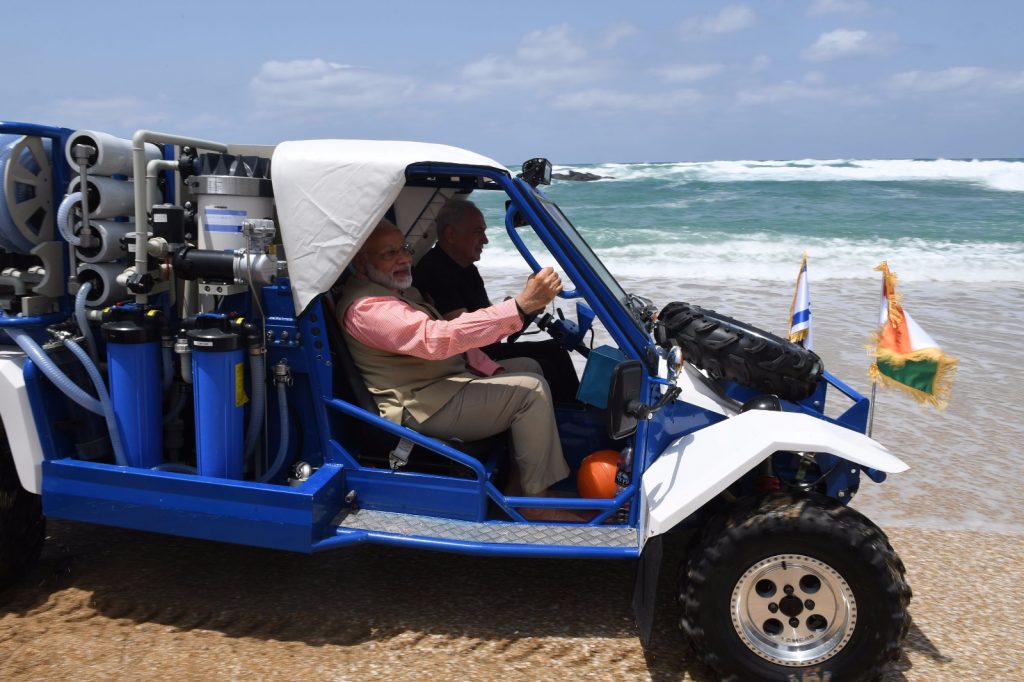
PM Narendra Modi with PM Benjamin Netanyahu in a mobile desalination unit in Israel in July 2017. Photo by Kobi Gideon, GPO
Israel is a top supplier of weapons to India, with defense deals of over $2 billion in 2017. These include a deal announced in April that will see Israel supply medium-range surface-to-air missiles, launchers and other products to India.
Bilateral trade between the two countries was valued at over $4 billion in 2016, according to a June report by the Israeli Ministry of Economy.
Trip highlights
Netanyahu’s delegation of 30 government officials and 100 businesspeople includes representatives of 25 Israeli startups, 18 of which were selected to participate in the Israel-India Global Innovation Challenge launched in July during Modi’s visit to Israel. The seven others are cleantech startups, whose reps are making the trip at the request of Netanyahu, according to Vered Mivtzari, the Country Relations Director for India at Start-Up Nation Central.
During the trip, Israel and India are set to sign a number of bilateral agreements and memorandums of understandings in a number of fields including energy, cybersecurity, agriculture, homeopathy, and film production.
The Indian press is reporting that Israel is set to invest more than $68 million over the next four years to boost Israel-India cooperation in areas like tourism and innovation. This follows the announcement this past July that Israel would launch the Israel India Innovation Fund (I4F), a $40 million fund initiative to foster tech innovation and R&D in industrial development, and build strategic partnerships in areas like water conservation, using wastewater for agriculture, and desalination.
Over the course of the trip, Netanyahu will attend a number of business-related events, including a conference on January 15, according to Mivtzari. The conference will focus on investment and innovation and how Israeli innovation can be used in the Indian market. The event will include a roundtable with Invest India, a government agency, that will discuss ways to facilitate and guide Israeli companies’ entry into the Indian market. In addition, a session of 30 Israeli and Indian CEOs, the Indo-Israeli CEO forum, plan to file recommendations to Netanyahu and Modi on avenues of cooperation. Netanyahu is to meet with members of the forum, which was launched in the summer when Modi visited Israel.
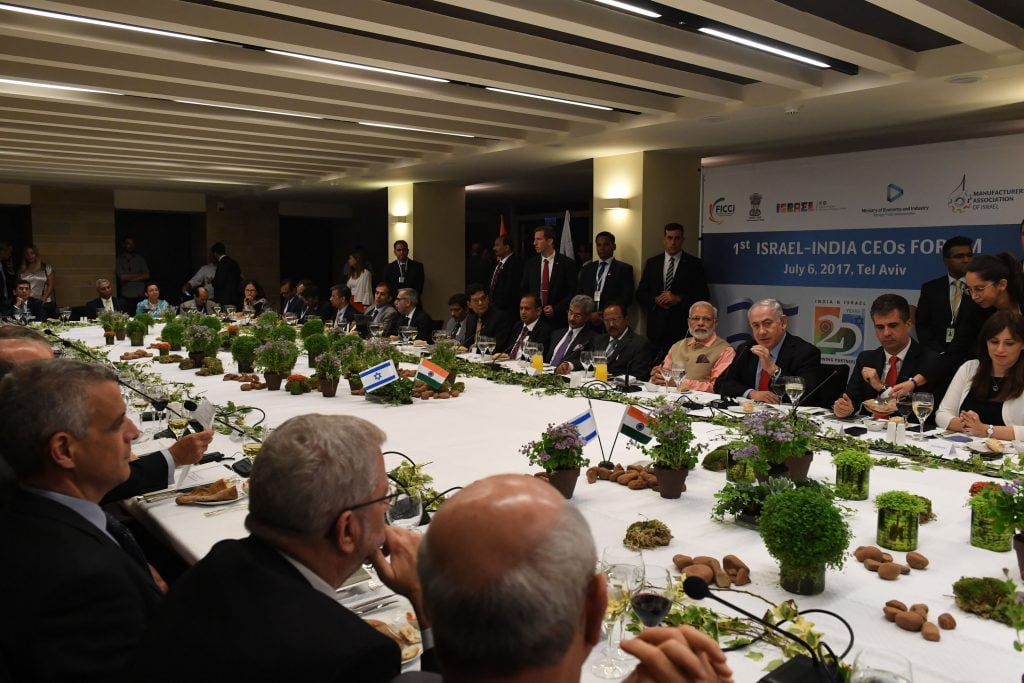
PM Netanyahu and Indian PM Narendra Modi speak with the Israeli-Indian CEOs forum, in Tel Aviv in July 2017. Photo by Kobi Gideon, GPO
On January 16, Netanyahu will visit the Taj Mahal, and attend the “Raisina Dialogue,” an annual India geo-political conference.
A day later, Netanyahu and Modi will visit the Indian PM’s home state of Gujarat to visit a number of “centers of excellence.” These include at least 18 centers set up across different states in India through the Indo-Israeli Agricultural Project (IIAP), a 10-year-old collaboration project between Indian and Israeli government agencies including MASHAV, Israel’s agency for international development cooperation. In an interview with Delhi-based business daily LiveMint, ahead of Netanyahu’s trip, the counsellor of science and agriculture at MASHAV in New Delhi, Dan Alluf says much of the focus of the centers are “on drip irrigation and how to design better farms by using canopy management and use of improved irrigation and fertigation technologies.” He added that the goal of the program “is to help the Indian farmer by exposing them to new technologies tailored to their local needs,” and that every year “between 10,000 and 20,000 farmers visit each of these centers, and we hope the technologies we are showcasing will echo, carried forward by state governments and the private sector.”
Can anyone guess why a team of @IsraelinIndia @IsraelMFA and @IsraelPMO headed by DCM @mayanetivot went yesterday on a field trip to the great State of #Gujarat and visited the #Vadrad #Vegetables @MASHAVisrael #CenterofExcellence? @GilHaskel @AmbYuvalFuchs pic.twitter.com/LtU2Nopn7t
— Daniel Carmon🇮🇱 (@danielocarmon) January 11, 2018
Netanyahu is set to inaugurate a new center of excellence for date palms during the trip to Gujarat, as well as pay a visit to India’s iCreate, a center for budding entrepreneurs.
Sign up for our free weekly newsletter
SubscribeOn January 18, Netanyahu will attend a memorial ceremony for the victims of the Mumbai terror attacks in 2008, during which more than a 160 people were killed. The attacks were carried out by groups of terrorists who laid a 60-hour siege on multiple targets, including the Chabad House in Mumbai, known as Nariman House, where they killed a Chabad emissary and his six-month pregnant wife and four others. The couple’s first child, a toddler at the time, survived the assault by hiding with his Indian nanny. The child and the nanny, both of whom live in Israel, are set to accompany Netanyahu on the visit.
Later that night, Netanyahu and members of the delegation are set to rub shoulders with stars and executives from Bollywood, India’s billion-dollar film industry at an event the Israeli embassy in New Delhi named “Shalom Bollywood.” Israeli officials hope the soirée will lead to business opportunities for Indian filmmakers in Israel.
“You can imagine the effect that would have on tourism, on Israel’s exposure,” Cohen was quoted by AFP as saying.
A number of Bollywood stars were in Israel last October to film scenes for an action movie set to be released later this year.
India-Israel Innovation Challenge
Eighteen startups from each country were selected earlier this month for the India-Israel Innovation Challenge as part of the India-Israel Innovation Bridge announced last July and which called on Israeli and Indian entrepreneurs to partner for solutions in the spheres of agriculture, water technology, and digital health, areas where India faces unique challenges due to its size and demographics. Six companies per country were selected for each of the three categories.
The program is a joint initiative of the Israel Innovation Authority and the India Department of Industrial Policy and Promotion. Supporters of the project include Invest India, the Pears Program, which connects Israeli innovation with developing world challenges, iCreate and T-Hub, India’s largest incubator for startups, according to the Israeli Ministry of Economy.
In the Agtech category, the Israeli startups selected were Amaizz, which develops products that minimize produce losses caused by spoilage and mishandling; BotanoCap, with a technology to slow the spoilage of product during post-harvest storage and transportation; BioFeed, a company that specializes in spray-free solutions for fly control; Saillog, which uses artificial intelligence and computer vision algorithms to identify plant diseases and deficiencies; SupPlant, which provides monitoring and automated irrigation systems; and SeedTech, which uses light technology to increase yields.
In water tech, the six Israeli companies chosen include Maagan Infiltration, a company that develops industrial water filters with automatic self-cleaning; AMS Technologies, which develops and markets chemically and thermally stable ultrafiltration (UF) and nanofiltration (NF) membranes; Aqua HD, which specializes in filtration systems; Lishtot, Hebrew for “to drink,” which makes lightweight, portable devices that test for water contamination, and recently won an award at a CES event in Las Vegas; SunDwater, a company that develops water scarcity solutions by “converting unsafe or salt water into potable water for human consumption or irrigation”; and Aquallence, a provider of disinfection and purification water technologies.
In the digital health sphere, the startups selected were Sight, which developed a device that provides lab-quality blood testing and results; Zebra Medical Vision, an Israeli company that uses artificial intelligence to read medical scans in order to automatically detect anomalies, and that made international headlines in 2017 for partnering with Google Cloud to provide its technology for $1 medical scans; MobileODT, which combines “biomedical optics with the power and connectivity of cellular technology”; Camereyes, a startup that “leverages cutting edge optics and advanced deep learning algorithms to provide low cost, fully automated solution for places where professional eye care specialists may be scarce or far away”; Medivizor, “a personalized, AI-powered, ‘GPS’ to navigate chronic illness”; and Votis, which developed a technology for early screening for diabetic foot syndrome and associated pathologies.
In addition to being part of Netanyahu’s delegation and attending the business summit with industry leaders, the 18 startups earn a cross-border three-month mentoring package with Indian industry experts “matchmaking” with companies and investors to explore partnerships for an Indian pilot, and funding opportunities for prototype development and pilot execution, according to a release by the Pears Program. The startups in the water category are granted additional cash prizes, sponsored by Livpure, of INR 10.00 – 25.00 Lakh ($15,000-40,000).
Global Development Director for the Pears Program Dr. Aliza Inbal tells NoCamels that the point of the program is to “connect Israeli companies to the Indian market and facilitate their entry into that market through serious partners.”
“One of the major challenges Israeli companies face is that it’s hard to make those initial contact to move toward a pilot [for their products or services.] A common request in India is to show that it would work there. They’ll say, ‘oh great, it works in Denmark, show us that it can work here,'” she says.
She adds that Israel has a lot of companies that have “established technology that is not necessarily adapted to the Indian market.” Another common issue, she says, is cost. Indian contacts will counter that the Israelis’ products are “too expensive and need to be adapted to the Indian context.”
The fastest-growing markets in the world are not in the West, says Dr.Inbal, and Israeli companies need to better target their needs. The Israeli government understand this clearly and is “leading the private sector on this need to diversify and target non-Western markets,” she says.
The Indian startups selected for the program can be found here and have “different path,” says Dr. Inbal. They are not necessarily looking to enter the Israeli market but see Israel “as a good gateway into global markets.”
“It’s more about building a community and buildings bridges and having reference points like how Israelis engage with Silicon Valley [where there are well-established channels],” she says.
Related posts

Editors’ & Readers’ Choice: 10 Favorite NoCamels Articles

Forward Facing: What Does The Future Hold For Israeli High-Tech?

Impact Innovation: Israeli Startups That Could Shape Our Future


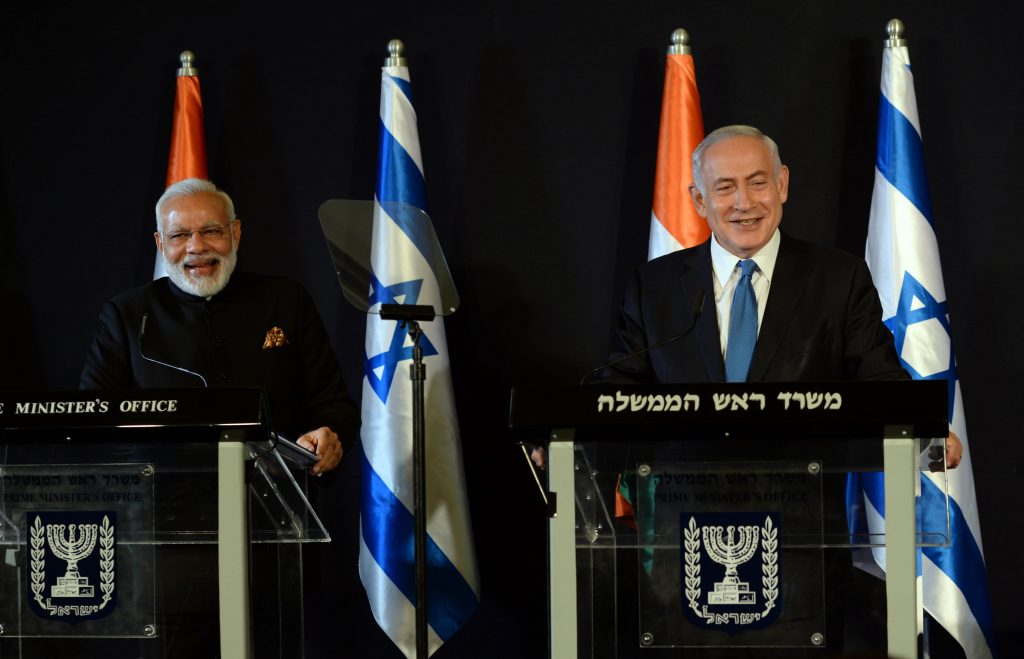

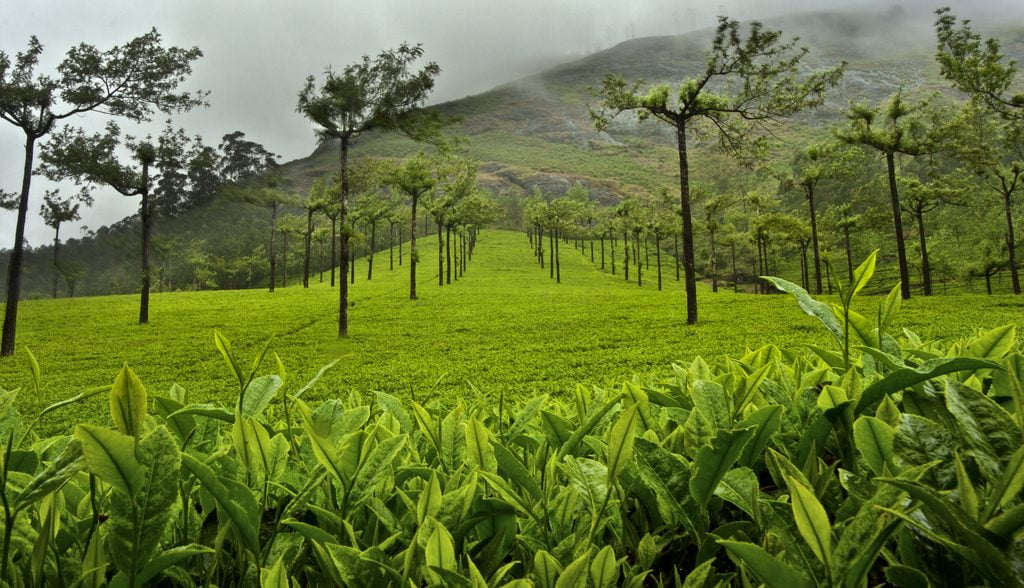
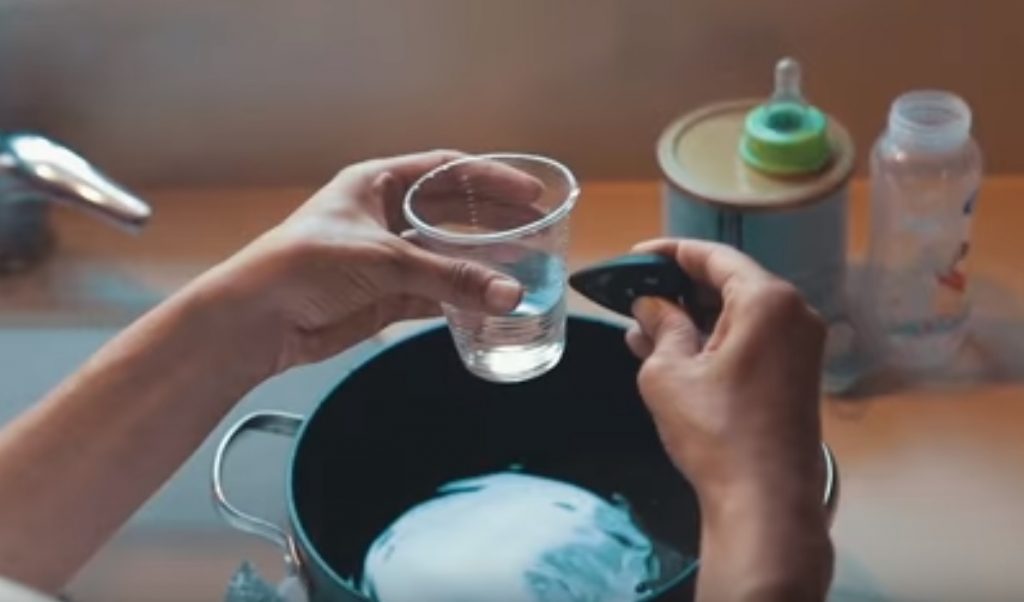
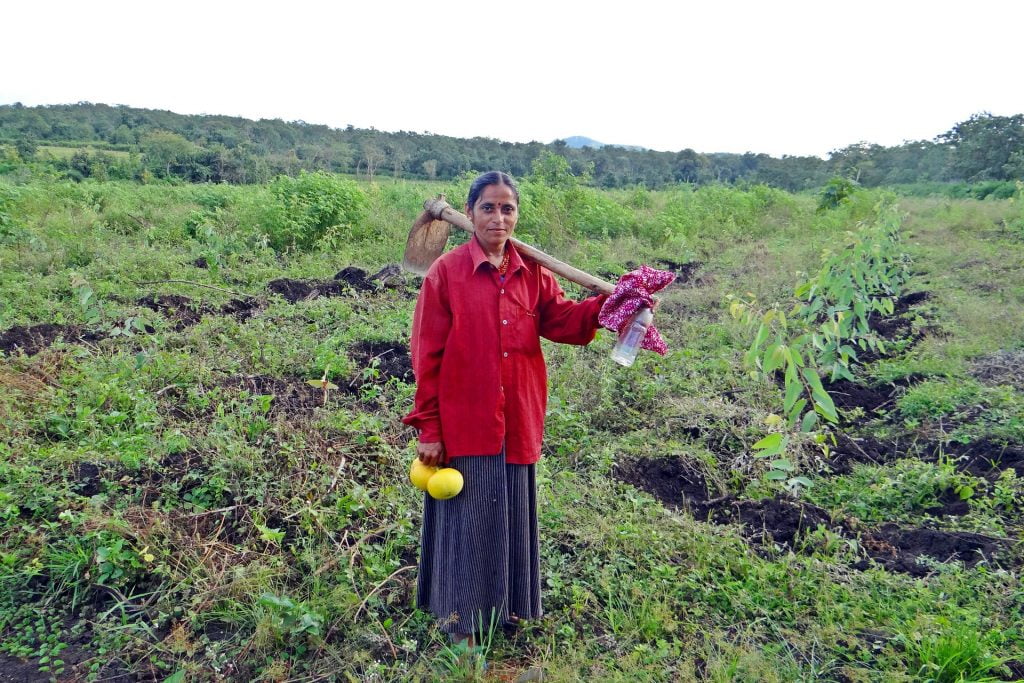

Facebook comments